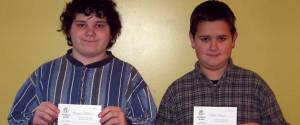Anthony Champoli wins LRMS geography bee
Anthony Champoli, an eighth grade student at Lake Region Middle School, won the school-level competition of the National Geographic Bee on Jan. 6 and a chance at a $25,000 college scholarship.
Anthony’s winning answer was “Croatia†to this question: “Zagreb is the capital of a country that includes islands off the coast of Dalmatia. Name this

FINALISTS — Bee champion Anthony Champoli (left) and runner-up Shaun Loreng hold gift certificates to Bridgton Books presented to them by Lake Region Middle School Principal Mr. Peter Mortenson.
country.â€
Shaun Loreng, an eighth grader, was the runner-up.
The school-level Bee, at which students answered questions on geography, was the first round in the 23rd annual National Geographic Bee. This year’s Bee is sponsored by Google.
The kickoff of this year’s Bee was the week of Nov. 15, with thousands of schools around the United States and in the five U.S. territories participating.
The school winners, including Anthony, will now take a written test; up to 100 of the top scorers in each state will be eligible to compete in their state Bee on April 1, 2011. Anthony won the school Bee last year and also participated at the state level.
The National Geographic Society will provide an all-expenses-paid trip to Washington, D.C., for the state champions and teacher-escorts to participate in the Bee national championship rounds on May 24-25, 2011. The first-place national winner will receive a $25,000 college scholarship, a lifetime membership in the Society, and a trip to the Galapagos Islands. “Jeopardy†host Alex Trebek will moderate the national finals on May 25. The program will air on television. Check local listings for dates and times.
Everyone can test their geography knowledge with the new and exciting GeoBee Challenge and online geography quiz at www.nationalgeographic.com/geobee. The game poses 10 new questions a day.
The National Geographic Society is one of the world’s largest nonprofit scientific and educational organizations. Founded in 1888 to “increase and diffuse geographic knowledge,†the Society works to inspire people to care about the planet. It reaches more than 370 million people worldwide each month through its official journal, “National Geographic,†and other magazines; National Geographic Channel; television documentaries; music; radio; films; books; DVDs; maps; exhibitions; live events; school publishing programs; interactive media; and merchandise. National Geographic has funded more than 9,000 scientific research projects and supports an education program promoting geographic literacy. For more information, visit nationalgeographic.com

